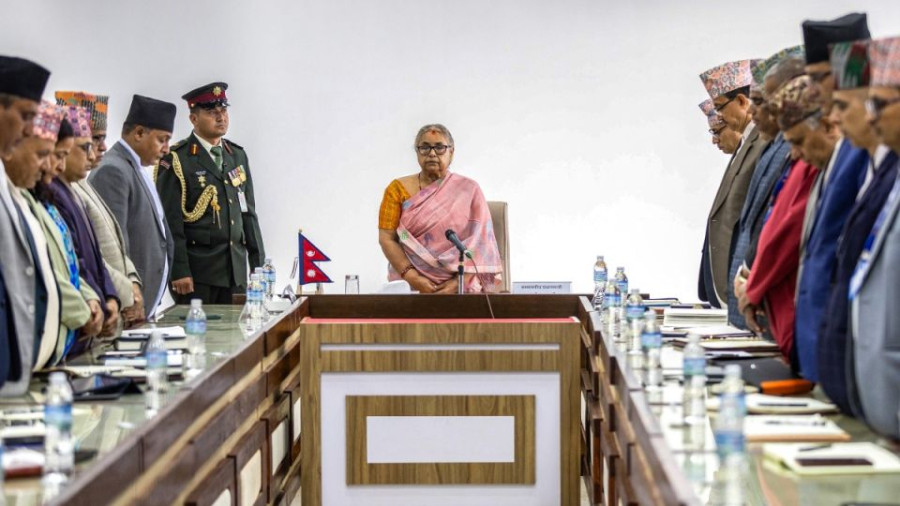Columns
We can’t afford failure
Don’t micro-manage the Karki government. Trust it to function and provide constructive criticism.
Naresh Koirala
Since the promulgation of the Constitution in 2015, the triumvirate of the leaders of the three largest parties, Sher Bahadur Deuba of the Nepali Congress (NC), KP Sharma Oli of the CPN-UML and Pushpa Kamal Dahal of the Maoist Centre, occupied the Office of Prime Minister several times in a shifting coalition. Under their watch, corruption in the country escalated to a new high and economic performance to a new low. The corrupt operated with impunity. They could do this because the Oli-Deuba-Dahal troika, during their time in office, progressively crippled the system of checks and balances by politicising all public institutions, including the judiciary; controlled the parliament by colluding with each other and denied the smaller parties’ calls for investigation of the corrupt. Gen Z’s eruption on September 8 was a response to years of this political perfidy. Their primary demand was the “end of corruption.”
On September 9, the protests turned violent in response to the Government killing 19 young, school-age demonstrators the previous day. Vested interests and agent provocateurs infiltrated the protests and set fire to numerous public buildings and private residences of politicians. The Chief of Army Staff told Prime Minister Oli, who remained dismissive of the previous day’s government-perpetrated violence, to resign, or his security could not be guaranteed. Oli capitulated.
The President dissolved the parliament on September 12 and, following Gen Z’s recommendation, appointed Sushila Karki as the Interim Prime Minister. Karki is a retired Chief Justice of the Supreme Court and an anti-corruption crusader. Her mandate is to conduct general elections on March 5, 2026.
The events of September 8 and 9 have made Gen Z and Karki mutually dependent. Gen Z needs PM Karki to advance their agenda, which aligns with most of the Nepalis’ goals, and she needs Gen Z’s support to withstand pressure from the older parties. Nepal could experience severe political turmoil if the relationship between Gen Z and the Karki government sours and her government falls. Gen Z might be blamed for such a crisis if they are not cautious in their demands on the government.
Let us start with some positive outcomes from the protest before getting into concerns with the fall of the Karki government.
Positive outcomes
The most visible outcome is that the protest has deeply humiliated the corrupt enterprise of the UML-NC coalition, and Oli has resigned. Gen Z-ers have sent a message to one and all: Those in power—whether politicians, bureaucrats, members of the judiciary, or heads of constitutional bodies—are under constant scrutiny by a vigilant citizenry. There is no impunity for graft; do not ever take people’s silence for granted. Politics is a highly utilitarian; don’t cite your past ‘sacrifices’ to justify today’s crimes; deliver now if you want to be relevant and be respected.
Thanks to Gen Z, we now have a cabinet fit for a 21st-century government. The cabinet members are free from corruption allegations, and many are experts in their fields. We have a finance minister who can compare notes with international financial experts and speak their language, not someone unaware of financial terminology. We have an energy minister with a proven record of successfully delivering energy projects, not a wealthy politician entangled in graft. We have an education minister who genuinely values education and libraries.
Karki government and Nepal’s future
Karki’s primary mandate is to hold the election for the Federal Parliament on March 5. Fulfilling this mandate will require both swift preparation for the election and, equally urgently, the initiation of investigations into high-profile corruption scandals. The investigation is vital for Karki to maintain Gen Z’s trust in her and her government.
According to the Election Commission, the election can proceed as planned, provided the government supplies sufficient resources. Over the years, the EC has demonstrated its capacity by completing many polls. Based on this, one can be confident that the physical process of conducting the election will not cause any problems.
The elephant in the room is the political parties. The legitimacy of the election will be undermined if major political parties do not participate. Whether they will do so is still uncertain. As of this writing, only the Maoist Centre has announced its intention to take part. The larger parties, particularly the UML, the NC and the Maoist Centre, have substantial resources and a strong organisational presence nationwide. If they choose not to participate, they could potentially jeopardise the entire process.
The UML is already challenging the constitutionality of the Karki government and threatening to take the matter to court. Karki will need support from Gen Z to counter pressure from political parties and persuade them to participate without causing disruption.
Furthermore, to ensure the new parliament’s effectiveness, unlike previous ones, Karki must enact several new laws through presidential ordinances. These laws will include measures to prevent corrupt charlatans and incompetents from dominating the new parliament; to ensure that members of parliament and parliamentary appointments adhere to internationally accepted parliamentary norms; to prohibit the use of money and other incentives to buy votes; and to prevent public money from being handed to parliamentarians as project funds. She also needs to empower the police so they feel they are working for the country and the people, not politicians.
Established political parties which benefit from current lax laws will do everything they can to oppose the enactment of the new regulations and undermine Karki’s efforts. She will need strong political resolve, courage and tact to face such challenges. Support from Gen Z would be crucial.
Gen Z exerting pressure on the government to act in ways that directly conflict with the Constitution is unhelpful. For instance, conducting elections with a directly elected executive or making arbitrary arrests of Oli and his associates can have severe long-term consequences. Gen Z’s protest was essentially a plea for the rule of law, which the post-2015 governments had abandoned entirely. The election for a directly elected executive conflicts with the current Constitution, and the Karki government cannot implement it. Moreover, there is no evidence that the stability of a directly elected executive leads to improved economic performance. Arbitrary arrests without due process set a precedent that conflicts with basic principles of the rule of law. Che Guevara killed and imprisoned thousands of people considered corrupt after the success of the Cuban Revolution. That did not stop corruption in Cuba’s communist government.
The fall of the Karki government is likely to result in direct military intervention. This could lead to a military dictatorship or a government controlled by the military, similar to Pakistan. No one would want that. Gen Z must recognise that constitutional safeguards against the abuse of power by political elites are not enough on their own to prevent abuse. The most effective protection against abuse is to elect a leader with unwavering integrity, high competence and a conscious awareness of their responsibilities; a leader who respects the spirit of the Constitution, not just its words.
Gen Z has, for the time being, liberated Nepal from the domination of large parties and their abuse of power, but do not be blinded by the euphoria. Gen Z should now focus their time and energy on developing a campaign strategy to ensure that capable candidates, untainted by corruption and committed to value-based politics, are elected in the upcoming election. Do not try to micro-manage the government; instead, trust it to function and provide constructive criticism.
The success of the Karki government will be a crucial step towards establishing the rule of law and promoting economic prosperity. Gen Z plays a vital role in ensuring this success. If Karki fails, we could end up like Egypt, Libya, or Tunisia after the Arab Spring. We don’t want that!




 11.12°C Kathmandu
11.12°C Kathmandu















